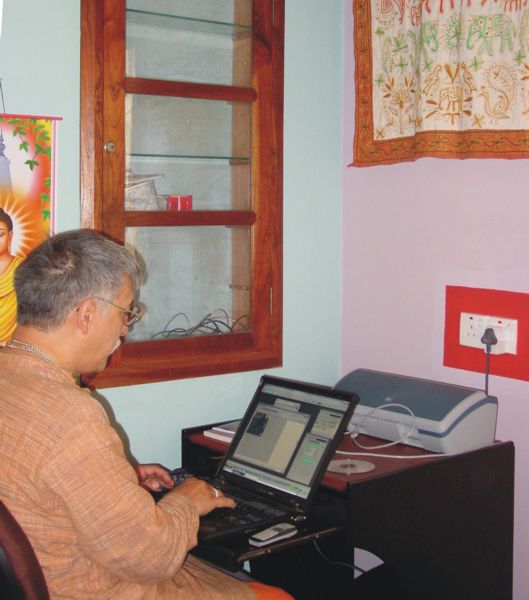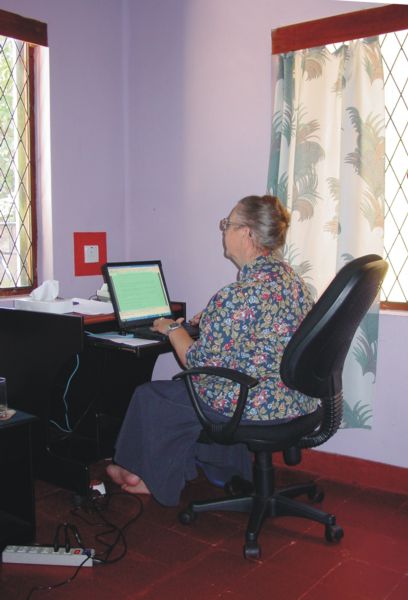Birds, Beasts, and Flower Curry, January 7, 2006
 Our house has several unusual features, including a small sink in the dining room, for
washing up before and after eating. People here eat with their hands, which, after all, came
long before forks were invented. (Forks are really highly overrated!) Now that we’ve gotten
used to our handy dining-room sink, we wonder, “How did we ever get along without one?!”
Our house has several unusual features, including a small sink in the dining room, for
washing up before and after eating. People here eat with their hands, which, after all, came
long before forks were invented. (Forks are really highly overrated!) Now that we’ve gotten
used to our handy dining-room sink, we wonder, “How did we ever get along without one?!”
Our neighborhood here in Kandy is notable for a lack. We never hear roosters in the early morning. That's not because we're sleeping too soundly. There just aren’t any. Everywhere else we’ve been in Southeast Asia an avian wake-up call was routine. We remember some of the oddest crowings in Panat Nikhom, the town south of Bangkok, where we worked in the refugee processing center. One fellow always did his 4 AM ritual at full volume "Cock-a- doodle D-o-o-o-o," the last syllable fading out on a falling scale. Another crowed in a very strong voice, "Cock a doodle!" followed by a great gaping silence. We’re not sorry that Anniewatte is without chickens.
This is a remarkable time of year for visiting birds. Don’t think bird flu. So far, we've been assured by the tremendously reliable, on top of every issue, authorities that there is no bird flu in Sri Lanka. They may want to take credit for that, but it probably has to do with the fact that there just isn't much of a poultry industry at all, and people do not live with chickens and pigs. Perhaps most importantly, shoppers do not go to live markets and order critters to be slaughtered right there. That's where the real threat comes from, we gather. Think Chinese-style animal rearing on an agro-business scale--very scary!
Even though we don’t have many chickens, we do have lots of other birds, which is what we started to say before the poultry industry got in the way. Some very lovely little ones have long and curved beaks, perfect for dipping into deep flowers for nectar. Although they are called humming birds here, they land sometimes on a branch to rest or to eat, unlike hummingbirds we’ve known before. These fellows travel in quiet flocks, all enjoying one kind of flowering tree together. When they've had enough, by some secret signal, they all agree to fly on.
We’ve seen great, huge, dramatic woodpeckers on some trees nearby, but have not yet heard them at work, unless they have mufflers? Every day Lily and we feed our noisy family of birds, which are really unremarkable to the eye but sing a wide variety of melodious songs--sort of the pop stars of the neighborhood. The whole world knows when used grated coconut or extra rice has been put out for them; they sing their hearts out in happiness. We’ve also seen a dramatic yellow bird with a line of black on his wings, who is evidently passing through Kandy in migration from colder climes. Local birds include common parrots, parakeets, iridescent kingfishers, and mourning doves very similar to those in Michigan. The longer we spend watching, of course, the more we'll be able to spot.
Just before we left for our trip, we were wakened in the dark early hours of the morning by an abrupt and very loud "BYU!" What the @#$! was that? we asked each other. Two years ago at the Burapa, we heard a similar sound, but it was the smoke alarm warning that the battery needed to be changed. This sound, coming from outside, had a much greater volume. Later we asked Lily, imitating what we’d heard. She said it was a bird. "A bird with big eyes that flies at night." An owl! No soft and creepy "Hoo-hoo!" for him!
We have also seen lots of butterflies here. Some regularly visit our garden. In front of the
house there is a gorgeous delicate orange flower on a vine that grows along a long arbor. It
attracts butterflies exactly the same color as the flowers, as many as ten at a time. Talk about
camouflage!
Before Christmas the nearby Riverdale Hotel (where we swim) got decorated with colored
lights. One day we noticed that they had also put up a tree. With glasses off it looked very
festive, with blinking lights, but what were those large egg-shaped pieces of paper hanging
from the branches and blowing in the wind? Later, as we started to leave, with glasses on, we
saw that it was decorated with balloons instead of balls. The next time we saw it, the
balloons had lost all their oomph; they were deflated and hanging limp on the ersatz tree, and
it wasn’t even Christmas yet.
Another day, as we returned from swimming, wearing our Julie kimonos over our suits, just as we turned into the drive, a lean older woman walked up to Visakha and in great seriousness asked, "Uhazmaida?" with a rising intonation so it was obviously a question. All Visakha could do was say, "I’m sorry. I don’t understand." After walking up the hill and opening the gate, she realized the woman had been asking if we needed a housemaid. Actually, that is the fourth time we have been approached by a woman wanting to work for us. Fortunately for us (but unlucky for them), we already have Lily, who is a jewel!
There weren't many signs of the holidays. Christmas slipped by without much ado; there was a very sedate little party in the valley directly below us, with some carols. New Years Eve was spent in Anuradhapura, where we were staying in a very simple guest house. The only sign was a number of very loud fire crackers, exploded at random. The loudest went off at two AM, long after new year had come. Sri Lankans, of course, have their own new year April 13th and 14th, which we expect is more enthusiastically observed.
We've become quite accustomed to special Sri Lankan breakfasts. If we need to be up and out very early, for example, to teach a class, we have toast, peanut butter and cereal. If we have time, Lily really seems to enjoy cooking special dishes for us--South Indian dosa (tho-se {two syllables} in Sinhalese) is Visakha’s favorite, with kirihode coconut gravy and a mild sambol. String hoppers is still Ken's favorite. (We have been wondering why it always sounded like "steam" instead of "string" when Lily has talked about them. We have just learned that some call them "steam hoppers." We say some because we KNOW that we have seen "string hoppers" in print somewhere. Perhaps it is a case of different terms in Colombo and upcountry. We'll have to investigate and let you know later. This came up when our driver corrected Visakha and explained, "Steam! Like a steam engine!") Lily has also done pittu which is steamed ground rice served with gravy. Of course, we also enjoy lots of tasty fruits and lots of different vegetables. The dish that defies categorization, though it is not for breakfast, is a curry made from white flowers. Delicious and, we trust, wholesome as well.
Communication! Well, we try, but sometimes it just doesn’t work. One day, we really liked the brinjal (eggplant) sambol Lily cooked. We told her so, and added, "Next time, cook more." The next time she served it, the beautiful brinjal slices were almost burned to a crisp. We pondered for a few minutes on what had gone wrong. Finally Ken figured out how to phrase the question and asked, "Lily, when we said 'Cook more,' did you think we meant 'more eggplant' or 'more time'? She replied straightforwardly, "More time." When that was clarified, we had a truly generous portion the next time!

 We finally broke down and bought computer desks for our laptops. Working on various other surfaces was really getting painful for the shoulders. We’ve moved everything into our office now, which means that the cords, computer, extension, and internet have all become rational at last. It is a very pleasant room in which to work, but one thing bothered us. Right over Ken's desk is the fuse box and a big gray master switch box, both protruding from the wall. Certainly not attractive to glance up at while working. What to do? Why not cover them with some local handicraft? We had seen some batik and handicraft shops on the way to our English class in Peradeniya, so we explained what we wanted to a reliable tuk-tuk driver, and on the way back, we visited several of the shops. We were very surprised to find many familiar items; evidently, the Sri Lankans are copying folkcraft from other parts of Asia, including Burmese tapestries on purses, Thai silk bags, and Pakistani embroidery. We asked where these items were made, and the honest answer was Sri Lanka. One clerk admitted that she was aware that the craft was copied. No respect for traditional cultural property, we see. Funny. Anyway, we found a beautiful hanging with local designs in exactly the right size. It is a bright and cheerful addition to our workspace, and it hides those boxes.
We finally broke down and bought computer desks for our laptops. Working on various other surfaces was really getting painful for the shoulders. We’ve moved everything into our office now, which means that the cords, computer, extension, and internet have all become rational at last. It is a very pleasant room in which to work, but one thing bothered us. Right over Ken's desk is the fuse box and a big gray master switch box, both protruding from the wall. Certainly not attractive to glance up at while working. What to do? Why not cover them with some local handicraft? We had seen some batik and handicraft shops on the way to our English class in Peradeniya, so we explained what we wanted to a reliable tuk-tuk driver, and on the way back, we visited several of the shops. We were very surprised to find many familiar items; evidently, the Sri Lankans are copying folkcraft from other parts of Asia, including Burmese tapestries on purses, Thai silk bags, and Pakistani embroidery. We asked where these items were made, and the honest answer was Sri Lanka. One clerk admitted that she was aware that the craft was copied. No respect for traditional cultural property, we see. Funny. Anyway, we found a beautiful hanging with local designs in exactly the right size. It is a bright and cheerful addition to our workspace, and it hides those boxes.
It's easy to forget how little money people have or need here to survive on. Sri Lanka is said to have a smaller gap between haves and have nots than anywhere else in Asia, but the poverty is still serious. (The gap in the US between the haves and have mores, let alone the have nots, is greater now than it was at the turn of the twentieth century, the time of Rockefeller, Carnegie, J.P. Morgan, and John Jacob Astor! Thanks, Shrub!) Sri Lankans dress well, and the cadjan houses (woven palm fronds) we used to see are now quite rare. Most houses are brick and plaster, attractively painted. Still, people are painfully aware of even a tiny increase in food prices. To us, it seems very reasonable to spend 65 rupees for a bag of basmati rice, but. for many, that is extravagant living. We try to find a balance between bargaining for a reasonable price, such as local people pay (since we are now local!), and being generous, because we are clearly much better off than the people who do things for us. We also try to give to those who ask for money, no matter what. Often we end up buying something that we don’t really need because the seller does need.
For a long time we've wanted to get locally-made waste baskets for the house and a suitable hamper for laundry as well. Nothing in any of the various shops we’ve tried. One day, after a swim we saw a Tamil woman with two little children in tow with a big bamboo basket, obviously handmade. It had a lid cleverly fashioned with a handle out of green bamboo. Just the right thing for dirty clothes! The clerk at the hotel named a lower price and we bargained a bit ourselves. When the deal was struck, we had to go back to the house for the cash. Lily assured us that it was too much, but no problem. The seller asked for milk and biscuits for the children, but Lily warned us that she’d be back every day if she thought she could get something more from us. The inflated cost of the basket was quite enough! Fine. We have seen the seller and her kids since, with other baskets, and she always gives us a smile and a big hello. She obviously is satisfied with her profits.
Back to Table of Contents

Buddhist Relief Mission
|
|
|
|
 Our house has several unusual features, including a small sink in the dining room, for
washing up before and after eating. People here eat with their hands, which, after all, came
long before forks were invented. (Forks are really highly overrated!) Now that we’ve gotten
used to our handy dining-room sink, we wonder, “How did we ever get along without one?!”
Our house has several unusual features, including a small sink in the dining room, for
washing up before and after eating. People here eat with their hands, which, after all, came
long before forks were invented. (Forks are really highly overrated!) Now that we’ve gotten
used to our handy dining-room sink, we wonder, “How did we ever get along without one?!”
 We finally broke down and bought computer desks for our laptops. Working on various other surfaces was really getting painful for the shoulders. We’ve moved everything into our office now, which means that the cords, computer, extension, and internet have all become rational at last. It is a very pleasant room in which to work, but one thing bothered us. Right over Ken's desk is the fuse box and a big gray master switch box, both protruding from the wall. Certainly not attractive to glance up at while working. What to do? Why not cover them with some local handicraft? We had seen some batik and handicraft shops on the way to our English class in Peradeniya, so we explained what we wanted to a reliable tuk-tuk driver, and on the way back, we visited several of the shops. We were very surprised to find many familiar items; evidently, the Sri Lankans are copying folkcraft from other parts of Asia, including Burmese tapestries on purses, Thai silk bags, and Pakistani embroidery. We asked where these items were made, and the honest answer was Sri Lanka. One clerk admitted that she was aware that the craft was copied. No respect for traditional cultural property, we see. Funny. Anyway, we found a beautiful hanging with local designs in exactly the right size. It is a bright and cheerful addition to our workspace, and it hides those boxes.
We finally broke down and bought computer desks for our laptops. Working on various other surfaces was really getting painful for the shoulders. We’ve moved everything into our office now, which means that the cords, computer, extension, and internet have all become rational at last. It is a very pleasant room in which to work, but one thing bothered us. Right over Ken's desk is the fuse box and a big gray master switch box, both protruding from the wall. Certainly not attractive to glance up at while working. What to do? Why not cover them with some local handicraft? We had seen some batik and handicraft shops on the way to our English class in Peradeniya, so we explained what we wanted to a reliable tuk-tuk driver, and on the way back, we visited several of the shops. We were very surprised to find many familiar items; evidently, the Sri Lankans are copying folkcraft from other parts of Asia, including Burmese tapestries on purses, Thai silk bags, and Pakistani embroidery. We asked where these items were made, and the honest answer was Sri Lanka. One clerk admitted that she was aware that the craft was copied. No respect for traditional cultural property, we see. Funny. Anyway, we found a beautiful hanging with local designs in exactly the right size. It is a bright and cheerful addition to our workspace, and it hides those boxes.























